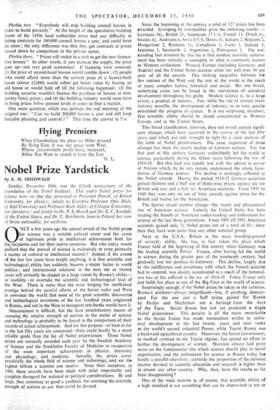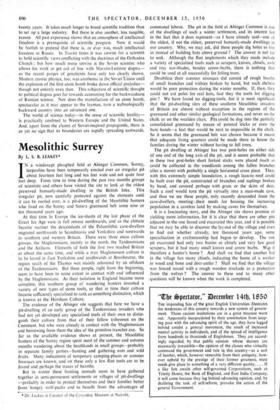Nobel Prize Yardstick
By E. M. FRIEDWALD Sunday, December 101h, was the fiftieth anniversary of the foundation of the Nobel Institute. This year's Nobel prizes for science were on that day presented to Professor Powell, of Bristol University, for physics; jointly to Emeritus Professor Otto Diels, of Kiel University and Professor Kurt Alder, of Cologne University, for chemistry ; and jointly to Dr. P. S. Hench and Dr. E. C. Kendall, of the United States, and Dr. T. Reichstein, born in Poland but now of Swiss nationality, for medicine.
ONLY a few years ago the annual award of the Nobel prizes for science was a notable cultural event and the cause of legitimate pride in intellectual achievement both for the ecipients and for their native countries. But who today would pretend that the pursuit of science is exclusively or even primarily a matter of cultural or intellectual interest? Indeed, if the events of the last few years have taught anything, it is that scientific and technological ability has suddenly become a major factor in world politics ; and international relations in the next ten or twenty years will certainly be shaped to a large extent by Russia's ability— or inability—to overtake the scientific and technological lead of the West. There is more than the mere longing for intellectual prestige behind the painful efforts of the Soviet radio and Press to convince the world that most of the great scientific discoveries and technological inventions of the last hundred years originated in Russia, and not in the West as bourgeois text-books would have it.
Measurement is difficult, but the least unsatisfactory means of assessing the relative strength of nations in the realm of science and technology is probably to be found in the comparison of their records of actual achieyement. And for this purpose—at least as far as the last fifty years are concerned—there could hardly be a more reliable guide than the list of Nobel prizewinners Three Nobel prizes are normally awarded each year by the Swedish Academy of Science and the Stockholm Faculty of Medicine in recognition of the most important achievement in physics, chemistry and physiology, and medicine. Actually, the prizes cover practically the whole field of science and technology, and are the highest tribute a scientist can receive. Since their inception. in 1901, these awards have been rrilde with strict impartiality and complete disregard for national or political considerations. By and large, they constitute as good a yardstick for assessing the scientific strength of nations as any that could be devised. Since the beginning of the century a total of 127 prizes has been awarded. Grouping by nationalities gives the following results :- Germans 341, British 21, Americans 17 1/6, French 13, Dutch 61, Swedes 61, Austrians 6, Swiss 45/6, Danes 41, Italians 2, Belgians 2, Hungarians 2, Russians 11, Canadians I, 1-inns 1, Indians 1, Japanese 1, Spaniards 1, Argentines 1, Portuguese 1. The out- standing fact revealed by this list is that modern scientific achieve- ment has been virtually a monopoly of what is commonly known as Western civilisation. Western Europe (including Germany and Austria) and the United States account alone for well over 90 per cent. of all the awards. This striking inequality between the few nations of the West and the rest of the world is the result of many complex factors, historical and social. But one broad, underlying cause can be found in the unevenness of industrial development throughout the globe. Modern science is, to a large extent, a product of industry. For, while the rise of science made industry possible, the development of industry, in its turn, greatly stimulated the progress of science. It is not surprising, therefore, that scientific ability should be found concentrated in Western Europe, and in the United States.
This broad classification, however, does not reveal certain signifi- cant changes which have occurred in the course of the last fifty years and which are only brought to light by a close analysis of the table of Nobel prizewinners. The most important of these changes has been the recent decline of German science. For the first part of this century Germany undoubtedly led the world in science, particularly during the fifteen years following the war of 1914-18. But this lead was rapidly lost with the advent to power of Nazism which, by its very nature, undermined the whole foun- dation of German science. The decline is strikingly reflected in the Nobel awards. During the period 1918-32 German scientists gained thirteen and a half out of thirty-nine prizes, against six for British and two and a half for American scientists. From 1933 to 1949 they won only six out of forty awards, against seven for the British and twelve for the Americans.
The figures reveal another change—the recent and phenomenal rise of American science. Latterly the United States has been reaping the benefit of American understanding and enthusiasm for science of the last three generations. From 1901 till 1931 American scientists gained only 31 Nobel prizes out of a total of 81; since then they have won more than any other national group.
Next to the U.S.A.. Britain is the main breeding-ground of sci-.!ntifi.: ability. She has, in fact, taken the place which France held at the beginning of this century when Germany was the leading scientific Power. France, after having led the world in science during the greater part of the nineteenth century, had gradually lost her position to Germany. This decline, largely due to the indifference and parsimony with which the French scientist had to contend, was sharply accentuated as a result of the tremend- ous loss of life suffered in the wa - of 1914-18 Today France only just holds her place as one of the Big Four in the world of science.
Surprisingly enough, if the Nobel prizes be taken as the criterion, Russia s position—always insignificant—has, if anything, deteriorL ated. For the one and a half prizes gained for Russia by Pavlov and Mechnikov are a heritage from the days of the Tsars. Soviet Russia has not yet produced a single Nobel prizewinner. This paucity is all the more remarkable as the Soviet Union has made trerriendous strides in indus- trial development in the last twenty years and now ranks as the world's second industrial Power, while Tsarist Russia was a backward agricultural country Moreover, the Soviet Government, in marked contrast to the Tsarist regime, has spared no effort to further the development of science. Marxism always laid great stress on the fundamental role which science should play in social organisation, and the enthusiasm for science in Russia today has hardly a parallel elsewhere ; certainly the proportion of the national income devoted to scientific education and research is higher than in almost any other country. Why, then, have the results so far been disappointing ?
One of the main reasons is, of course, that scientific ability of a high standard is not something that can be improvised in ten or twenty years. It takes much longer to breed scientific tradition than to set up a large industry. But there is also another, less tangible, reason All past experience shows that an atmosphere of intellectual freedom is a prerequisite of scientific progress. Now it would be foolish to pretend that there is, or e\ler was, much intellectual freedom in Russia. In Tsarist times jt was unwise for a scientist to hold scientific views conflicting with the doctrines of the Orthodox Church ; but how much more unwise is the Soviet scientist who allows his work to get out of line with Marxist-Leninist dogma— as the recent purges of geneticists have only too clearly shown. Modern atomic physics, too, was anathema in the Soviet 'Union until the explosion of the first atom bomb broke down official prejudice— though not entirely even then. This subjection of scientific thought to political dogma goes far towards accounting for the backwardness of Russian science. Nor does the manufacture of an atom bomb, spectacular as it may appear to the layman, turn a technologically backward country into an advanced one.
The world of science today—in the sense of scientific fertility— is practically confined to Western Europe and the United States. And, apart from the claims of Soviet-inspired propaganda, there is as yet no sign that its boundaries are rapidly spreading eastwards.







































 Previous page
Previous page